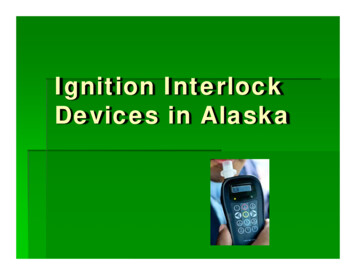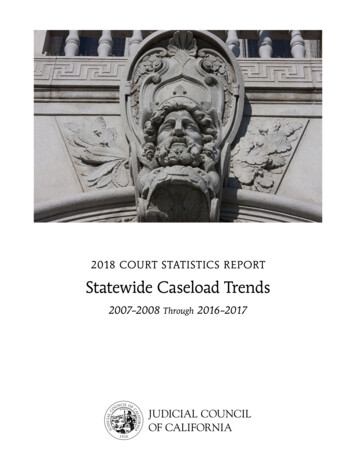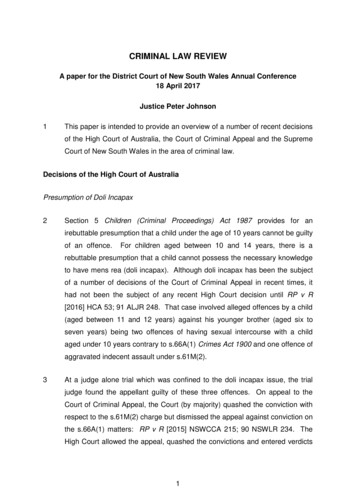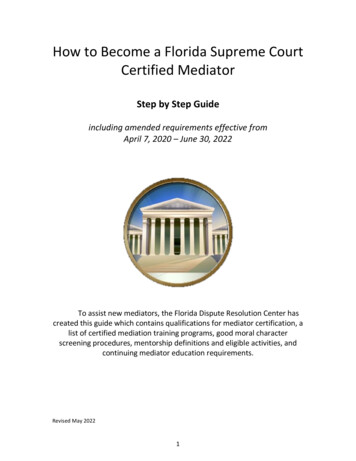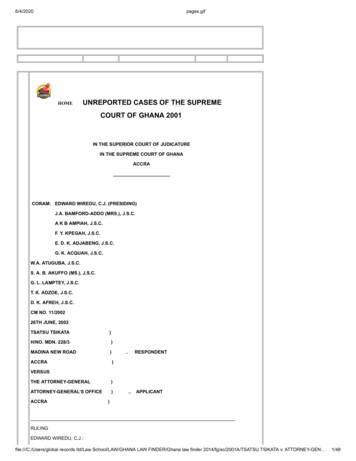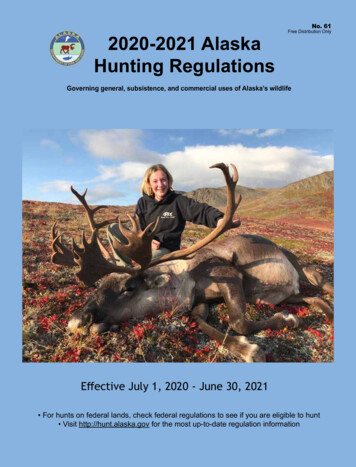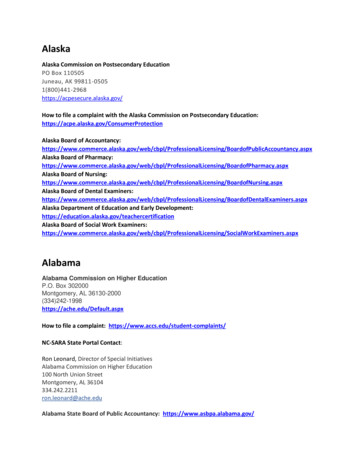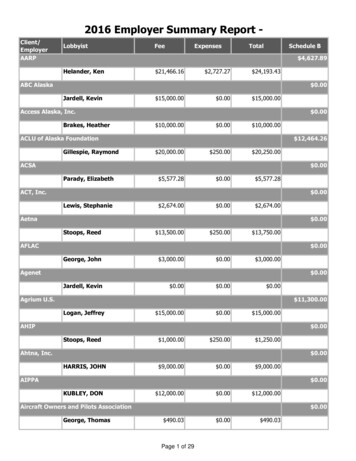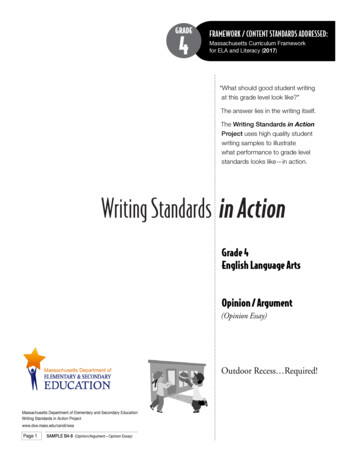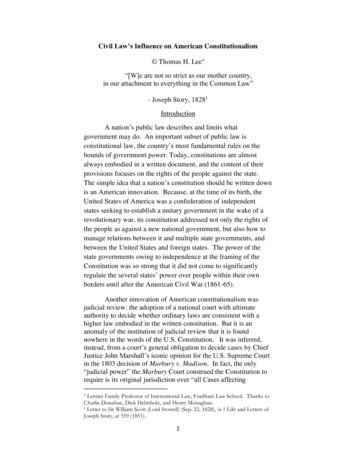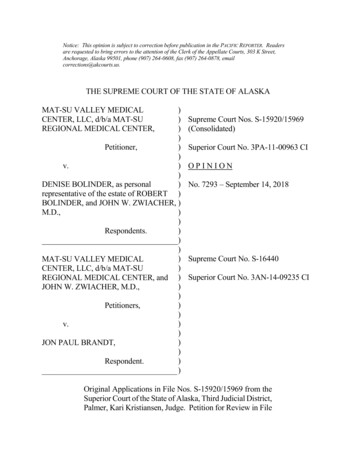
Transcription
Notice: This opinion is subject to correction before publication in the PACIFIC REPORTER. Readersare requested to bring errors to the attention of the Clerk of the Appellate Courts, 303 K Street,Anchorage, Alaska 99501, phone (907) 264-0608, fax (907) 264-0878, emailcorrections@akcourts.us.THE SUPREME COURT OF THE STATE OF ALASKAMAT-SU VALLEY MEDICALCENTER, LLC, d/b/a MAT-SUREGIONAL MEDICAL CENTER,))))Petitioner,))v.))DENISE BOLINDER, as personal)representative of the estate of ROBERT )BOLINDER, and JOHN W. ZWIACHER, )M.D.,))Respondents.))))MAT-SU VALLEY MEDICAL)CENTER, LLC, d/b/a MAT-SUREGIONAL MEDICAL CENTER, and ))JOHN W. ZWIACHER, M.D.,))Petitioners,))v.))JON PAUL BRANDT,))Respondent.)Supreme Court Nos. S-15920/15969(Consolidated)Superior Court No. 3PA-11-00963 CIOPINIONNo. 7293 – September 14, 2018Supreme Court No. S-16440Superior Court No. 3AN-14-09235 CIOriginal Applications in File Nos. S-15920/15969 from theSuperior Court of the State of Alaska, Third Judicial District,Palmer, Kari Kristiansen, Judge. Petition for Review in File
No. S-16440 from the Superior Court of the State of Alaska,Third Judicial District, Anchorage, Gregory Miller, Judge.Appearances: Robert J. Dickson, Atkinson, Conway &Gagnon, and Roger F. Holmes, Biss & Holmes, Anchorage,for Petitioner Mat-Su Regional Medical Center. Christian N.Bataille, Flanigan & Bataille, Anchorage, for RespondentsBolinder and Brandt. Scott Leuning, Leuning & Renner,LLC, Sioux Falls, South Dakota, and Whitney L. Traeger andHoward A. Lazar, Delaney Wiles, Inc., Anchorage, forRespondent and Petitioner Dr. Zwiacher. Stephen D. Rose,Garvey Schubert Barer, Anchorage, for Amicus CuriaeAlaska State Hospital and Nursing Home Association.Chester D. Gilmore, Cashion Gilmore LLC, Anchorage, forAmicus Curiae Providence Health & Services – Washingtond/b/a Providence Alaska Medical Center.MargaretSimonian, Dillon & Findley, P.C., Anchorage, andWilliam S. Cummings, Friedman Rubin, Bremerton,Washington, for Amicus Curiae Alaska Association forJustice.Before: Stowers, Chief Justice, Winfree, Maassen, Bolger,and Carney, Justices.BOLGER, Justice.I.INTRODUCTIONAlaska’s medical peer review privilege statute, AS 18.23.030, protectsdiscovery of data, information, proceedings, and records of medical peer revieworganizations, but it does not protect a witness’s personal knowledge and observationsor materials originating outside the medical peer review process. A hospital invoked theprivilege in two separate actions, one involving a wrongful death suit against a physicianat the hospital and the other involving both a medical malpractice claim against the samephysician and a negligent credentialing claim against the hospital. In each case the-2-7293
superior court compelled the hospital to disclose materials related to complaintssubmitted about the physician and to the hospital’s decision to grant the physicianmedical staff membership. The hospital and the doctor sought our review of thediscovery orders. Because we conclude that these discovery orders compel the hospitalto disclose information protected by the peer review privilege, we reverse the discoveryorders in part. We further hold that the false information exception to the privilegeprovided in AS 18.23.030(b) applies to actions for which the submission of falseinformation is an element of the claim and thus does not apply here.II.FACTS AND PROCEEDINGSWe address these two interlocutory appeals in this consolidated opinion dueto the similarity of the facts, legal issues, and parties. In the first case, Denise Bolinder,in her capacity as the personal representative of the estate of Robert Bolinder, filed aclaim for wrongful death against Dr. John Zwiacher, alleging that Dr. Zwiacher wasnegligent in treating Robert Bolinder when he was a patient at Mat-Su Regional MedicalCenter (Mat-Su) in 2009. In the second, Jon Brandt brought a claim for medicalmalpractice against Dr. Zwiacher and a negligent credentialing claim against Mat-Suafter Brandt allegedly suffered complications from a September 2012 surgeryDr. Zwiacher performed at Mat-Su. In each case, Mat-Su refused to respond todiscovery requests for materials related to (1) Mat-Su’s decisions to renewDr. Zwiacher’s medical staff membership at Mat-Su; and (2) complaints that Mat-Su hadreceived regarding Dr. Zwiacher. Mat-Su asserted that, because all the requestedmaterials were acquired or generated by Mat-Su’s peer review committees, they wereprivileged under the medical peer review statute and not subject to disclosure.-3-7293
A.The Medical Peer Review Privilege Statute And Mat-Su’s Peer ReviewCommitteesSome background on medical peer review generally, and the peer reviewcommittees at Mat-Su specifically, is necessary. Medical peer review “refers to theprocess hospitals use to oversee medical staff to improve patient care, reduce hospitalliability, and lower rates for malpractice insurance.”1 Generally, the purpose of affordingan evidentiary privilege to peer review materials is to promote candor in peer reviewproceedings, with the aim of more rigorous oversight of medical care and lowermalpractice premiums.2 Nearly all hospitals employ peer review procedures.3 Andalmost all 50 states have adopted laws promoting the effectiveness of peer review by:(1) providing immunity from liability for persons serving on or providing informationin good faith to peer review committees, and (2) creating an evidentiary privilege forcertain materials related to the peer review process.4Alaska’s medical peer review privilege statute, AS 18.23.030, was enactedin 1976 as part of a broad, comprehensive bill intended to address the lack of malpracticeinsurance available to Alaska doctors.5 The statute restricts discovery of information and1Grandstaff v. State, 171 P.3d 1176, 1193 (Alaska App. 2007).2Id.3Charles David Creech, Comment, The Medical Review CommitteePrivilege: A Jurisdictional Survey, 67 N.C. L. REV. 179, 179 (1988).4Id. at 179-180; see also Eric Scott Bell, Comment, Make Way: WhyArkansas and the States Should Narrow Health Care Peer Review Privileges for thePatient Safety and Quality Improvement Act of 2005, 62 ARK. L. REV. 745, 751-52(2009).5STATE OF ALASKA, REPORT OF THE GOVERNOR’S MEDICAL MALPRACTICEINSURANCE COMMISSION 52-53 (Oct. 1,1975),(continued.)-4-7293
data acquired by medical peer review organizations, along with the proceedings andrecords of those organizations. The privilege is subject to certain exceptions, includingmaterials “otherwise available from original sources” or information within anindividual’s personal knowledge, and materials provided to a peer review organizationthat are alleged to contain knowingly false information.Disclosing privilegedinformation is a misdemeanor.6Mat-Su has two committees that it argues are protected by the peer reviewprivilege. The first committee is the Medical Staff Peer Review Committee (PeerReview Committee), which is charged with reviewing all care provided by Mat-Suphysicians and maintaining quality patient care within Mat-Su. The Peer ReviewCommittee conducts professional practice evaluations of physicians, as is required forhospital accreditation. It consists of various Mat-Su personnel: the chairs of eachclinical section, physicians from various specialities, a nursing representative, and anadministrative representative.The second committee is the Medical ExecutiveCommittee (Executive Committee), which reviews reports and recommendations fromthe Peer Review Committee regarding any corrective action. The Executive Committeeconsists of physician representatives from each specialty group at Mat-Su. TheExecutive Committee makes decisions regarding both initial credentialing of health careproviders and renewal of credentials, with the Board of Trustees making the finaldecision on any matter involving privileges or the loss SURANCE%20COMMISSION.pdf [hereinafter MALPRACTICE COMMISSION REPORT].6AS 18.23.040.-5-7293
B.First Petition In Bolinder v. ZwiacherIn January 2009 Dr. Zwiacher performed a diagnostic surgery on RobertBolinder to examine an unidentified mass in his lungs and collect tissue samples. Threedays after the surgery, Robert began experiencing pain in his left leg, and his wife,Denise, called Dr. Zwiacher. Dr. Zwiacher asked to speak with Robert, but there is adispute regarding what Dr. Zwiacher then said. According to Dr. Zwiacher, he toldRobert to go to the emergency room. But Denise claims that Robert told her thatDr. Zwiacher said a pinched nerve likely was causing his pain and advised Robert to restat home. Later that same day, Robert died at home. An autopsy showed that his deathwas caused by multiple pulmonary emboli — blood clots lodging in and blockingarteries in the lungs — that likely came from the leg in which he was experiencing pain.In 2011 Denise, as the personal representative of Robert’s estate (theEstate), filed a wrongful death claim against Dr. Zwiacher alleging that he negligentlytreated Robert.The Estate conducted discovery to elicit information aboutDr. Zwiacher’s background preceding his position at Mat-Su, when he practicedmedicine in Wisconsin. This information apparently suggested that Dr. Zwiachermisrepresented his work and disciplinary history on his 2005 application for an Alaskamedical license and his 2006 application for medical staff membership at Mat-Su. Toconfirm this indication, the Estate moved to compel Dr. Zwiacher to consent to Mat-Su(a non-party) releasing his application for medical staff membership.7 After the superiorcourt denied the motion in April 2012, the Estate petitioned this court for interlocutoryreview.7In addition to medical staff membership, Dr. Zwiacher also applied for (andwas granted) clinical privileges. To avoid confusion between his clinical privileges andthe evidentiary privilege at issue here, we refer to Dr. Zwiacher’s application as beingonly for medical staff membership.-6-7293
In 2013 we granted the petition and reversed the denial of the motion tocompel.8 We held for the purposes of “this case” that one of the exceptions to the peerreview privilege, excluding certain material alleged to contain false information,9applied. We concluded that the application was not privileged because the Estate hadsubmitted evidence showing Dr. Zwiacher had lied on his application for an Alaskamedical license, which suggested he also provided this false information in applying toMat-Su.10 However, “we d[id] not decide” how this exception to the privilege “shouldbe interpreted or how it may apply in future cases” given the parties’ cursory briefingand lack of argument on the scope of the exception.11 We thus ordered Mat-Su toprovide Dr. Zwiacher’s application to the Estate.C.The Estate’s Discovery Requests To Mat-SuFollowing our order, Mat-Su provided the Estate with Dr. Zwiacher’s initialapplication for medical staff membership. Mat-Su also produced documents revealingthat Dr. Zwiacher’s medical staff membership at Mat-Su had been revoked in April 2014and detailing the disciplinary steps that preceded the revocation. The Estate amendedits complaint to allege that Dr. Zwiacher obtained the privileges necessary to treat Robertby lying about his work history on his application to Mat-Su.The Estate then made several discovery requests of Mat-Su. First the Estaterequested “[a]ll documents related in any way to the evaluation and granting of[Dr. Zwiacher’s] [medical staff membership] at Mat-Su Regional” and asked to depose8Bolinder v. Zwiacher, No. S-14710 (Alaska Supreme Court Order, Dec. 4,2013) [hereinafter Bolinder Order].9AS 18.23.030(b).10Bolinder Order, supra note 8.11Id.-7-7293
people knowledgeable about Mat-Su’s decision to grant him membership. Mat-Suobjected, citing the peer review privilege. The Estate also sought to depose Mat-Supersonnel with knowledge of the identity of individuals “likely to possess personalknowledge regarding [Dr. Zwiacher’s] professional credibility, behavior, and/orconduct” including knowledge of any limitation or revocation of Dr. Zwiacher’s medicalstaff membership imposed by Mat-Su. Mat-Su again objected on the basis of the peerreview privilege to the extent the request asked for more than the designation ofindividuals with personal knowledge of Dr. Zwiacher’s credibility. Mat-Su thendesignated Joan Brodie, the assistant director of quality risk management and providerservices, to testify on these topics.Brodie’s job duties include overseeing thecredentialing process, addressing regulatory compliance issues, and participating in thepeer review process.At the deposition Brodie provided the names of several general surgeons,anesthesiologists, and hospitalists who might have information about Dr. Zwiacher’scredibility. She also advised the Estate to contact the heads of the nursing and operatingroom staffs to obtain information about others who had worked with him. But, citing thepeer review privilege, Mat-Su objected to many of the Estate’s inquiries, including thoseasking whether any complaints had been raised about Dr. Zwiacher and the nature ofBrodie’s interactions with him. Brodie explained that “every contact [she] had with[Dr. Zwiacher] was within . . . the course of what [she] do[es]”; therefore she could notanswer such questions because the information was privileged.The Estate additionally sought to depose Drs. John Naylor and Bruce Hess.Dr. Hess served as the president of the medical staff before Dr. Naylor assumed theposition. Dr. Naylor served as the president of the medical staff, chaired the ExecutiveCommittee, and worked at Mat-Su as an anesthesiologist. In early January 2015, whenthe deposition was taken, Dr. Naylor had served as president of the medical staff for-8-7293
about nine months. Though the Estate did ultimately depose Dr. Naylor, it did notdepose Dr. Hess.Dr. Naylor testified that, as president of the medical staff, he serves as thechair of the Executive Committee. He had also previously served as the chair of the PeerReview Committee. Dr. Naylor explained that the peer review process is initiated byconcerns and complaints from Mat-Su staff. Dr. Naylor confirmed that outside the peerreview process “nothing ever happened with [him] and Dr. Zwiacher that in any waygave [him] concern or raised an issue regarding [Dr. Zwiacher’s] patient care with [him]personally.” And because his familiarity with Dr. Zwiacher’s competency and surgicalcare derived from the peer review process, he could not answer questions about thesetopics. Mat-Su objected to questions asking Dr. Naylor to identify people withinformation related to concerns or complaints about Dr. Zwiacher and asking for“original sources . . . [with] information regarding Dr. Zwiacher’s behavior and conduct. . . at the hospital.” Dr. Naylor contended he could not divulge such informationbecause he had acquired it through his role in the peer review process. He explained that“[a]ny complaint or issue . . . that enters the peer review or quality review system . . .falls under the [privilege’s] protection” and that this applied to all complaints aboutDr. Zwiacher.Following its unsuccessful attempts to elicit information at the depositions,the Estate filed two motions to compel disclosure from Mat-Su related to: (1) its decisionto grant Dr. Zwiacher medical staff membership and (2) complaints related toDr. Zwiacher’s competency and credibility, including the identity of people possessingpersonal knowledge of such information.The superior court granted both motions in two separate discovery orders.The first discovery order, issued on April 27, 2015, granted the Estate’s request todiscover materials related to the decision to grant Dr. Zwiacher’s application for medical-9-7293
staff membership. The superior court concluded that Mat-Su must disclose suchmaterials because the Estate alleged that Dr. Zwiacher knowingly included falseinformation in his application, and thus the materials fell within an exception to the peerreview privilege. The first order further permitted the Estate to obtain all materialsprovided to a peer review committee that were alleged to contain knowingly falseinformation, specifically:testimony, documents, proceedings, records, and otherevidence adduced before a review organization that areotherwise inaccessible under [the peer review privilege] if[the Estate] claims that information provided to a revieworganization was false and claims that the person providingthe information knew or had reason to know the informationwas false.The second discovery order, issued on June 10, 2015, granted the Estate’srequest to obtain complaints that Mat-Su had received about Dr. Zwiacher. The superiorcourt concluded that such complaints did not fall within the peer review privilege;though they may initiate the peer review process and later become evidence in a peerreview proceeding, they are not part of such a proceeding. Thus, subject to requests forin camera review, the court instructed employees and members of the medical staff atMat-Su with “personal knowledge” of such complaints to provide this information to theEstate “without regard to whether [they] presented such information to a peer reviewcommittee.” It also instructed Mat-Su and Dr. Zwiacher to “produce all documents orrecords . . . regarding complaints or concerns regarding Dr. Zwiacher’s conduct that werenot generated by or did not originate with a peer review committee.”Mat-Su filed an original application for review of these two discoveryorders, which we granted. Dr. Zwiacher and three amici curiae — Alaska Associationfor Justice, Alaska State Hospital and Nursing Home Association, and Providence-10-7293
Alaska Medical Center — also filed briefs.12 While the appeal was pending, the petitionfor interlocutory review in Brandt was filed.D.Petition In Brandt v. ZwiacherJon Brandt was also a patient of Dr. Zwiacher. Dr. Zwiacher performed alaparoscopic small bowel resection surgery on Brandt at Mat-Su in September 2012(when Dr. Zwiacher still had medical staff membership). During recovery, Brandtcomplained of pain; the parties dispute how Dr. Zwiacher addressed Brandt’s pain.Brandt was discharged from Mat-Su four days after surgery, which Brandt alleges wasinvoluntary. Brandt claims that upon discharge, his pain worsened; he returned to MatSu approximately eight hours later. A CT scan was performed, which Brandt claimsrevealed that Dr. Zwiacher had perforated the left side of his colon during the surgery,resulting in leaking and an infection. According to Brandt, he has undergone sevenadditional surgeries to address the issues stemming from the surgery performed byDr. Zwiacher.In September 2014, while discovery in Bolinder was still ongoing, Brandtfiled suit against Dr. Zwiacher and Mat-Su. Brandt brought a medical malpractice claimagainst Dr. Zwiacher, alleging that Dr. Zwiacher misrepresented his skills prior to thesurgery, delivered substandard medical care, created false and misleading records ofBrandt’s medical care following the surgery, and obtained both his medical license andhis Mat-Su medical staff membership through misrepresentation and non-disclosure.Brandt also brought a negligent credentialing claim against Mat-Su based on the12Alaska Association for Justice argues that we should affirm the discoveryorders; Alaska State Hospital and Nursing Home Association and Providence AlaskaMedical Center argue that we should reverse.-11-7293
hospital’s decision to grant and renew Dr. Zwiacher’s staff membership.13 Brandtclaimed that, given Dr. Zwiacher’s professional troubles in Wisconsin and the litany ofcomplaints regarding his conduct and standard of care while at Mat-Su, Mat-Su failedto act with reasonable diligence in vetting Dr. Zwiacher’s initial application for medicalstaff membership and in subsequently renewing it.Discovery ensued, during which Mat-Su voluntarily disclosed, subject toa protective order, Dr. Zwiacher’s entire 443-page credentials file, which contains all ofthe materials Mat-Su’s credentials committee used in granting Dr. Zwiacher’s initialappointment to the Mat-Su medical staff and all subsequent renewals. The file includesDr. Zwiacher’s initial application for medical staff membership at Mat-Su (the sameapplication that had led to the first petition for review in Bolinder).14 The credentials filealso contains confidential communications regarding Dr. Zwiacher to the ExecutiveCommittee written while his initial application was pending.13A negligent credentialing claim derives from the theory of corporatenegligence, under which “a hospital owes an independent duty to its patients to usereasonable care to insure that physicians granted hospital privileges are competent, andto supervise the medical treatment provided by members of its medical staff.” Fletcherv. S. Peninsula Hosp., 71 P.3d 833, 842 (Alaska 2003) (quoting Jackson v. Power,743 P.2d 1376, 1378 n.2 (Alaska 1987)). “A corporate negligence claim requires proofthat the hospital should have known that the physician would act negligently before thenegligence at issue occurred.” Ward v. Lutheran Hosps. & Homes Soc’y of Am., Inc.,963 P.2d 1031, 1033 n.2 (Alaska 1998). Such proof generally consists of “evidence thatthe physician either lacked standard credentials or previously had been the subject of amalpractice suit or disciplinary proceedings.” Id.14Mat-Su explains on appeal that it is not conceding that the initial credentialsfile is not privileged, but given this court’s prior order in Bolinder compelling disclosureof Dr. Zwiacher’s initial application and “the uncertainty surrounding the extent of theprotection afforded [to the file] by [the peer review privilege],” Mat-Su “felt compelledin good faith to produce the entire credentials file.”-12-7293
However, the credentials file does not contain any concerns or complaintsrelayed to Mat-Su regarding Dr. Zwiacher after he was granted medical staffmembership or regarding Mat-Su’s decision to terminate Dr. Zwiacher’s membership.Mat-Su explained that such materials were not part of the credentials file because theMat-Su Medical Staff Bylaws delegated the decision to discipline or to terminateDr. Zwiacher to the Peer Review Committee and the Executive Committee, not thecredentials committee.Accordingly, “[a]ll of the documents generated afterDr. Zwiacher’s appointment to the medical staff relating to complaints and concernsabout him . . . are outside the credentialing process and [are instead] reported tothe . . . [Peer Review Committee and Executive Committee].”After receiving the credentials file, Brandt sent six discovery requests toMat-Su that form the basis of his appeal. Like the requests in Bolinder, Brandt’s requestscan be divided into two broad groups: (1) documents related to any complaints madeabout Dr. Zwiacher, the identity of individuals making and reviewing the complaints, andany action taken in response; and (2) documents and statements related to Mat-Su’sdecisions to renew or terminate Dr. Zwiacher’s medical staff membership and theidentity of individuals involved in those decisions.Mat-Su objected to these discovery requests, asserting that each requestsought information covered by the peer review privilege.15 In March 2016 Brandt moved15Brandt quibbles with Mat-Su’s purported failure to produce a privilege login refusing to respond to the discovery requests. However, Brandt represents that MatSu ultimately did produce a privilege log that identified more than 1900 pages ofprivileged materials. This privilege log is not part of the appellate record because it wasproduced after the petition for review was granted. Brandt does not appear to take issuewith the adequacy of the privilege log that was ultimately produced; accordingly, we donot address this issue.-13-7293
to compel Mat-Su’s responses to the discovery requests.16 In its opposition, with respectto the first group of requested information, Mat-Su argued that the identities both ofindividuals reporting complaints about Dr. Zwiacher and of individuals considering thecomplaints were privileged. It explained that such complaints initiated the peer reviewprocess and were directed to peer review committee members, and they were thus partof the committee proceedings. Regarding the second group of requested information,Mat-Su conceded that it had not produced “the files and meeting minutes of the [PeerReview Committee] and the [Executive Committee], the purpose of which was to reviewthe quality of care provided by Dr. Zwiacher at the hospital subsequent to his obtainingprivileges,” but argued these materials were privileged. Mat-Su explained that, otherthan the credentials file and this privileged material, it possessed “no other documentedcommunication relating to Dr. Zwiacher’s renewal or termination.”In August 2016 the superior court granted Brandt’s motion to compel andordered production of all the information sought in the six production requests. Thecourt reasoned that the names of the individuals making complaints about Dr. Zwiacherand the content of those complaints were not privileged because they were based on thepersonal knowledge of individuals not acting in the capacity of peer review committeemembers. The superior court thus concluded that Mat-Su had failed to meet its burdenof establishing that the discovery requests fell within the scope of the privilege andaccordingly ordered Mat-Su to produce the requested materials. The superior court’sanalysis appears to have considered only one group of discovery requests (relating to16In his motion to compel, Brandt argued that by voluntarily producing thecredentialing file, Mat-Su had waived the protection of the peer review privilege asapplied to any of its files. However, Brandt does not renew this argument on appeal(despite Mat-Su mentioning this argument in its brief ); thus we deem it forfeited and donot address it.-14-7293
complaints) and not the other (relating to Mat-Su’s credentialing decisions). However,it ultimately compelled disclosure of all requested information.Mat-Su andDr. Zwiacher jointly petitioned for interlocutory review of the superior court’s order, andwe granted the petition.III.STANDARD OF REVIEWWe generally review discovery rulings for abuse of discretion, “but whethera privilege applies is a question of law we review independently.”17 Here, the scope ofthe privilege is codified in a statute.18 When interpreting statutes, we apply ourindependent judgment,19 adopting the “rule of law that is most persuasive in light ofprecedent, reason, and policy.”20IV.DISCUSSIONA.Alaska Statute 18.23.030 Provides Robust Protections For The MedicalPeer Review Process.This case requires us to interpret the scope of the medical peer reviewprivilege in the context of a wrongful death action and a medical malpractice claimagainst a surgeon, and a negligent credentialing claim against the surgeon’s hospital.The privilege, codified in AS 18.23.030, contains two subsections relevant to this case.The first, subsection (a), sets out the scope of the privilege and provides a specific17Peterson v. State, 280 P.3d 559, 561 (Alaska 2012).18See AS 18.23.030.19In their Bolinder briefs, Mat-Su and Dr. Zwiacher contend that the scopeof the peer review privilege also presents a question of fact: when the medical peerreview process begins at Mat-Su. This framing impermissibly invades the legislativeprovince by allowing a hospital to define AS 18.23.030’s scope. The issue here — thescope of the peer review privilege — presents only a question of law.20State v. Ketchikan Gateway Borough, 366 P.3d 86, 90 (Alaska 2016)(quoting Se. Alaska Conservation Council v. State, 202 P.3d 1162, 1167 (Alaska 2009)).-15-7293
limitation on it. The second, subsection (b), outlines two exceptions where the privilegedoes not apply. Aside from our 2013 limited order, we have never considered the scopeof either subsection.21This case thus requires interpretation of the peer review statute.“Interpretation of a statute begins with its text.”22 In addition to the text, we alsoconsider a statute’s legislative history and purpose.23 In construing a statute, we haveadopted a sliding scale approach whereby “[t]he plainer the statutory language is, themore convincing the evidence of contrary legislative purpose or intent must be.”24Whenever possible “we interpret each part or section of a statute with every other partor section, so as to create a harmonious whole.”25 Finally, because Alaska’s “civil rules21The court of appeals considered whether AS 18.23.030 applied in criminalcases in Grandstaff v. State, 171 P.3d 1176, 1190-97 (Alaska App. 2007). The court ofappeals concluded that the privilege applied only in civil cases based on the statute’splain language and legislative history. Id. at 1194. This appeal does not directlyimplicate the decision in Grandstaff.22City of Kenai v. Friends of The Recreation Ctr., Inc., 129 P.3d 452, 458-59(Alaska 2006).23Oels v. Anchorage Police Dep’t Emps. Ass’n, 279 P.3d 589, 595 (Alaska2012).24State, Dep’t of Commerce, Cmty. & Econ. Dev., Div. of Ins. v. AlyeskaPipeline Serv. Co., 262 P.3d 594, 597 (Alaska 2011) (quoting Gov’t Emps. Ins. Co. v.Graham-Gonzalez, 107 P.3d 279, 284 (Alaska 2005)).25McDonnell v. State Farm Mut. Auto. Ins. Co., 299 P.3d 715, 721 (Alaska2013) (quoting State, Dep’t of Commerce, Cmty., & Econ. Dev., Div. of Ins. v.Progressive Cas. Ins. Co., 165 P.3d 624, 629 (Alaska 2007)).-16-7293
favor a system of liberal pretrial discovery,”26 we generally construe an evidentiaryprivilege narrowly.27Subsection (a) outlines the scope of the peer review privilege in threesentences. The first sentence protects from discovery “all data and information acquiredby a review organization in the exercise of its duties and functions.”28 This s
Dr. Zwiacher performed at Mat-Su. In each case, Mat-Su refused to respond to discovery requests for materials related to (1) Mat-Su's decisions to renew Dr. Zwiacher's medical staff membership at Mat-Su; and (2) complaints that Mat-Su had received regarding Dr. Zwiacher. Mat-Su asserted that, because all the requested
